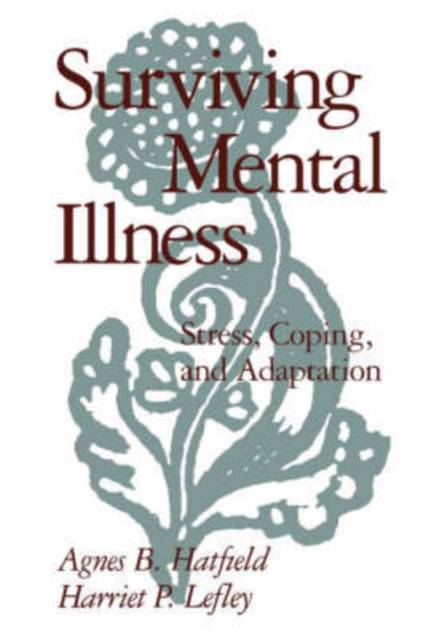
- Retrait gratuit dans votre magasin Club
- 7.000.000 titres dans notre catalogue
- Payer en toute sécurité
- Toujours un magasin près de chez vous
- Retrait gratuit dans votre magasin Club
- 7.000.0000 titres dans notre catalogue
- Payer en toute sécurité
- Toujours un magasin près de chez vous
Surviving Mental Illness
Stress, Coping, and Adaptation
Agnes B Hatfield, Harriet P Lefley
Livre broché | Anglais
49,95 €
+ 99 points
Description
In this era of revolutionary progress in the areas of science and medicine, it comes as no surprise that knowledge of the biology of mental illness and psychopharmacologic treatments has increased greatly within the past few decades. During this same time frame, however, the experiential side of mental illness has been almost completely neglected by researchers and educators. Fortunately, the trend is being reversed. Leading authorities are becoming increasingly aware that the personal experiences of people with severe and persistent mental illness can reveal the most authentic--and perhaps most helpful--information on behaviors that have long puzzled professionals in the field. This has contributed to a renewed and growing interest in learning more about the ways people experience mental illness and the process of recovery.
Leading the way in redressing the imbalance, this book examines the subjective experiences of patients with multiple diagnoses, including schizophrenia, bipolar illness, major endogenous depression, and other disorders with psychotic features and long-term disabling consequences. Numerous personal accounts are drawn from research reports, newsletters, journals, spoken reports, and observed behavior to shed light on the inner worlds of people afflicted with severe and persistent mental illness.
The volume covers a wide range of topics, starting with disturbances in the sense of self, in emotions, relationships, and behaviors, and in the ways reality is experienced by the mentally ill. In the process, some common patterns of lifetime experience are revealed even among patients with great differences in levels of functional capability and in their emotional and rational assessment of their experience.
The final section of the book is directed toward understanding the process of acceptance, growth toward recovery, and the development of an acceptable identity and new purpose in life.
Material is presented within the conceptual framework of coping and adaptation and self theory; in addition, considerable attention is given to the patient's perception of which types of personal and professional relationships have been helpful or not helpful. As a result, the book yields important lessons--from the patients themselves--on how service providers, caregivers, and the community at large can be most helpful to those afflicted with major mental illness.
Professionals who wish to increase their capacity for empathy, develop more effective rehabilitation strategies, and advance research linking brain anomalies and patient experience will find this book illuminating. Because it illustrates in moving and powerful ways how people truly experience psychiatric disability in a society that demeans their condition and in a helping environment that only dimly understands their agony, the book will be extremely useful for psychiatrists, psychologists, social workers, psychiatric nurses, educators, and graduate students in psychopathology and clinical skills training.
Leading the way in redressing the imbalance, this book examines the subjective experiences of patients with multiple diagnoses, including schizophrenia, bipolar illness, major endogenous depression, and other disorders with psychotic features and long-term disabling consequences. Numerous personal accounts are drawn from research reports, newsletters, journals, spoken reports, and observed behavior to shed light on the inner worlds of people afflicted with severe and persistent mental illness.
The volume covers a wide range of topics, starting with disturbances in the sense of self, in emotions, relationships, and behaviors, and in the ways reality is experienced by the mentally ill. In the process, some common patterns of lifetime experience are revealed even among patients with great differences in levels of functional capability and in their emotional and rational assessment of their experience.
The final section of the book is directed toward understanding the process of acceptance, growth toward recovery, and the development of an acceptable identity and new purpose in life.
Material is presented within the conceptual framework of coping and adaptation and self theory; in addition, considerable attention is given to the patient's perception of which types of personal and professional relationships have been helpful or not helpful. As a result, the book yields important lessons--from the patients themselves--on how service providers, caregivers, and the community at large can be most helpful to those afflicted with major mental illness.
Professionals who wish to increase their capacity for empathy, develop more effective rehabilitation strategies, and advance research linking brain anomalies and patient experience will find this book illuminating. Because it illustrates in moving and powerful ways how people truly experience psychiatric disability in a society that demeans their condition and in a helping environment that only dimly understands their agony, the book will be extremely useful for psychiatrists, psychologists, social workers, psychiatric nurses, educators, and graduate students in psychopathology and clinical skills training.
Spécifications
Parties prenantes
- Auteur(s) :
- Editeur:
Contenu
- Nombre de pages :
- 206
- Langue:
- Anglais
Caractéristiques
- EAN:
- 9780898620221
- Date de parution :
- 22-05-93
- Format:
- Livre broché
- Format numérique:
- Trade paperback (VS)
- Dimensions :
- 151 mm x 230 mm
- Poids :
- 326 g

Les avis
Nous publions uniquement les avis qui respectent les conditions requises. Consultez nos conditions pour les avis.






